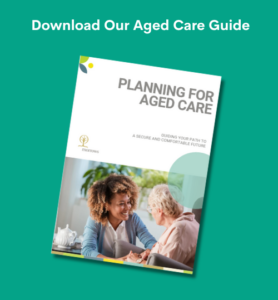Big changes are coming to home care. From 1 November 2025, the new Aged Care Act will come into effect, bringing significant changes to how home care is delivered and funded in Australia.
If you or a loved one currently receive support through a Home Care Package, it’s important to understand how the new Support at Home program will affect your care arrangements – including how services are managed and what you may need to contribute financially from November next year.
Now is the time to talk to your care provider and seek advice. If you’d like guidance, our Morrows Aged Care financial advisors are here to help.
What’s changing
From 1 November 2025, all Home Care Package recipients will move to the Support at Home program.
While the exact impact will depend on individual circumstances, there are two major changes to be aware of:
- A new fee structure, and
- Changes to how unspent funds are managed.
- New fee structure
The Government will continue to fund most of the cost of home support, but recipients will be asked to contribute towards certain services.
To determine your contribution, services will be grouped into three categories:
- Clinical care
- Independence support
- Everyday living
Clinical care services will be fully funded by the Government. For other categories, the amount you contribute will depend on your financial situation – with age pensioners paying less than self-funded retirees.
Overall, the new fees are expected to be higher. However, if you or your loved one were receiving a Home Care Package (or held approval for one) on 12 September 2024, you’ll be eligible for ‘grandfathering’ concessions. These concessions ensure that existing recipients are no worse off under the new system. To learn more about these changes, read our Support at Home article
- Unspent funds – Use it or Lose it!
The way care budgets work will also change.
Each quarter, you’ll receive an available budget based on your package level. This will operate on a “use it or lose it” basis.
If you don’t use all your funds within the quarter, you can only carry over up to $1,000 or 10% of your quarterly budget (whichever is greater). Any remaining funds will no longer be available.
Unspent funds that have accumulated before 31 October 2025 may still be available to spend on approved services at a later date.
What three things should do now?
To prepare for the upcoming changes, here’s what you or your loved one should do:
- Check your mail and keep your letter safe – You should have received a letter from the Department of Health, Aged Care and Disability explaining whether you are grandfathered and what contribution rates you can expect to pay. Keep this letter in a safe place and share a copy with your Morrows aged care financial adviser so we can help you understand what it means for your finances and ensure you’re well prepared.
- Watch for a second letter – After 1 November 2025, Services Australia will send another letter confirming your exact contribution rates.
- Speak with your care provider – Before 1 November 2025, review your current care plan and sign a new care agreement under their updated pricing structure.
How Morrows can help
Navigating aged care changes can be overwhelming – especially when supporting a loved one.
Book an Aged Care Information Session with a Morrows Adviser to get clarity on the new rules, review your options, and make confident decisions.
Please complete the form below to book your session and download our Aged Care Guide – your step-by-step resource to prepare for the changes before 1 November.
We’re here to support you and your family through every stage of aged care planning.

Download Our FREE Aged Care Guide!
To learn more about the aged care process, fees, and key considerations, please complete the form below to access our Aged Care Planning Guide.
And if you’d like to receive future updates or schedule a family information session, we invite you to register your interest below.
IMPORTANT INFORMATION: The information is general only and has been prepared without consideration of your individual objectives, financial situation or needs. Before making any decisions, you should consider the appropriateness of your personal investment objectives, financial situation or individual needs. We recommend you speak to your financial adviser, registered tax agent or legal adviser before making any decisions based on this information.

Emma Stoffels



